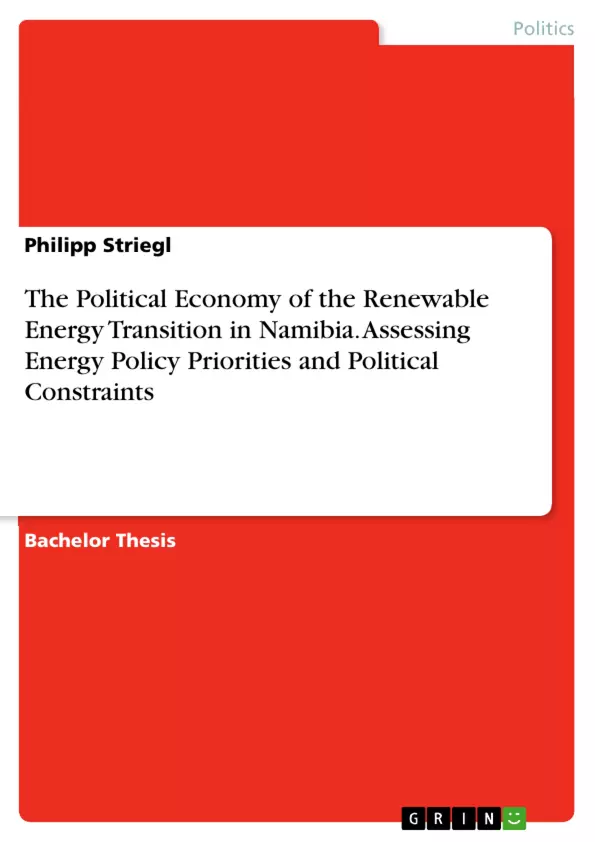Reducing global reliance on fossil fuels (oil, natural gas, and coal) as sources of energy generation is a critical component of curtailing the negative impacts of climate change on societies and livelihoods. At the same time, the share of renewable energy sources (including wind, solar, hydro, and geothermal) must be increased, a process referred to as "energy transition". The already dire global warming situation also requires increasing renewable energy generation in regions with relatively small contributions to global greenhouse gas emissions (GHG).
While much research has been conducted on the political economy of energy transitions in industrialized nations, political economy aspects of energy transitions in SSA have not received much analytical attention. This thesis thus seeks to examine how energy policy priorities are directed in Namibia. As an upper-middle income country with enormous potential for domestic renewable energy generation, Namibia’s energy transition still faces some considerable political and economic challenges. These challenges include a heavy reliance on energy imports and concerns around energy security.
To demonstrate energy policy priorities by the Namibian government, I performed a Qualitative Content Analysis (QCA) of strategic energy policy documents and speeches issued by the Namibian government. The analysis shows that energy security and reaching universal energy access constitute the main concerns of the Namibian government. It also suggests that fossil fuel utilization and increased renewable energy generation as policy priorities are not viewed as conflicting.
Inhaltsverzeichnis (Table of Contents)
- 1 Introduction
- 2 Literature Review
- 2.1 Context: Energy Transitions
- 2.2 The Socio-Technical Perspective
- 2.3 The Coalitions Approach to Energy Transitions
- 2.4 Power Relations and Critical Perspectives on Energy Transitions
- 2.5 Path Dependencies and Institutional Lock-Ins
- 3 Country Context: Namibia as a Case and Current State of Namibia's Energy Situation
- 4 Methodology
- 4.1 Analytical Procedure: Rules and Category Formation
- 4.2 Selected Material
- 4.3 Contextualizing the Material and Publishing Entities
- 5 Analysis of Namibia's Energy Policy Priorities
- 5.1 Analysis of the Material Based on Main and Sub-Category Frequency
- 5.2 Summary and Interpretation of the Findings
- 5.3 Critical Reflection of the Applied Research Procedure
- 6 Conclusions and Further Research Possibilities
- 7 References
- 8 Appendix
Zielsetzung und Themenschwerpunkte (Objectives and Key Themes)
This thesis aims to analyze how energy policy priorities are directed in Namibia, a country with enormous potential for domestic renewable energy generation but still faces considerable political and economic challenges, including a heavy reliance on energy imports and concerns around energy security. The study uses a qualitative content analysis (QCA) of strategic energy policy documents and speeches issued by the Namibian government to demonstrate energy policy priorities.
- The political economy of energy transitions in Sub-Saharan Africa (SSA)
- Energy policy priorities in Namibia
- The role of power relations and institutional lock-ins in shaping energy transitions
- The balance between fossil fuel utilization and renewable energy generation in Namibia's energy policy
- The importance of energy security and universal energy access in Namibia's energy policy
Zusammenfassung der Kapitel (Chapter Summaries)
- Chapter 1: Introduction: This chapter introduces the concept of energy transition and its importance in addressing climate change. It highlights the need for increased renewable energy generation, particularly in regions like sub-Saharan Africa (SSA) that are facing the consequences of climate change. The chapter also discusses the lack of research on the political economy of energy transitions in SSA and the specific challenges faced by Namibia.
- Chapter 2: Literature Review: This chapter reviews the existing literature on the political economy of energy transitions. It examines different theoretical frameworks, including the socio-technical perspective, the coalitions approach, power relations, and path dependencies. The chapter discusses how these frameworks can help understand the political constraints on energy transitions in SSA.
- Chapter 3: Country Context: Namibia as a Case and Current State of Namibia's Energy Situation: This chapter provides an overview of the energy situation in Namibia, outlining its energy sources, consumption patterns, and challenges related to energy security. It also highlights Namibia's potential for renewable energy generation.
- Chapter 4: Methodology: This chapter describes the research methodology used in the study. It explains the analytical procedure, the selection of material, and the process of contextualizing the material and publishing entities.
- Chapter 5: Analysis of Namibia's Energy Policy Priorities: This chapter presents the findings of the qualitative content analysis (QCA) conducted on Namibian government documents and speeches. It examines the main themes and sub-categories identified in the analysis, providing insights into the government's energy policy priorities.
Schlüsselwörter (Keywords)
This thesis focuses on the political economy of renewable energy transition in Namibia. Key terms and concepts include energy transition, renewable energy, fossil fuels, energy security, universal energy access, political constraints, power relations, institutional lock-ins, path dependencies, qualitative content analysis (QCA), and Namibian energy policy.
Frequently Asked Questions
What is the focus of this thesis on Namibia's energy transition?
The thesis examines the political economy of Namibia's transition to renewable energy, assessing government priorities and the political constraints that shape energy policy.
What are the main energy concerns of the Namibian government?
The primary concerns identified are ensuring energy security and achieving universal energy access for the population.
Is there a conflict between fossil fuels and renewables in Namibia's policy?
The analysis suggests that the Namibian government does not view fossil fuel utilization and increased renewable energy generation as conflicting priorities, but rather as complementary components of energy security.
What methodology was used to analyze Namibia's energy policy?
The researcher used Qualitative Content Analysis (QCA) of strategic energy policy documents and official government speeches.
What are the main challenges for Namibia's energy transition?
Key challenges include a heavy reliance on energy imports, institutional lock-ins, and the need to balance economic growth with environmental sustainability.
- Citation du texte
- Philipp Striegl (Auteur), 2023, The Political Economy of the Renewable Energy Transition in Namibia. Assessing Energy Policy Priorities and Political Constraints, Munich, GRIN Verlag, https://www.grin.com/document/1361246



